句子翻译正说反译反说正译
翻译技巧 之正说反译与反说正译

e.g. 800 people had been saved by the organization.
组织拯救了800人.
3、翻译成汉语判断句:不突出被动动 作,而着重于对事 物的状态、过程和性 质等加以描述,经常采用“是……的” 判断句。
e.g. This kind of device is much needed in the mechanical watch-making industry.
我一时想不起来这个名字。
2.Negative in English, Affirmative in Chinese 反说正译
e.g. My overcoat would not wear out.
我的大衣十分耐穿。
3.Double Negative for Emphasis 双重否定为强调
e.g. He was no small reputation as a scientist.
这种装置在机械表制造业中是很重要的。
4、把被动句中的“被”字用其它字替 代:“被”— “受、遭、让、由、得以、 受到、遭到、为……所”等。
e.g. The proposal on the improvement of the investment environment is accepted by all the members of the committee.
这条关于改善投资环境的建议为该委员会 全体委员所接受。
5、被动惯用句型:泛指我们、人们、 有人、大家等。
有人认为...
e.g. It is believed that almost all sudden deaths are caused by damage to the heart.
句子的正译与反译
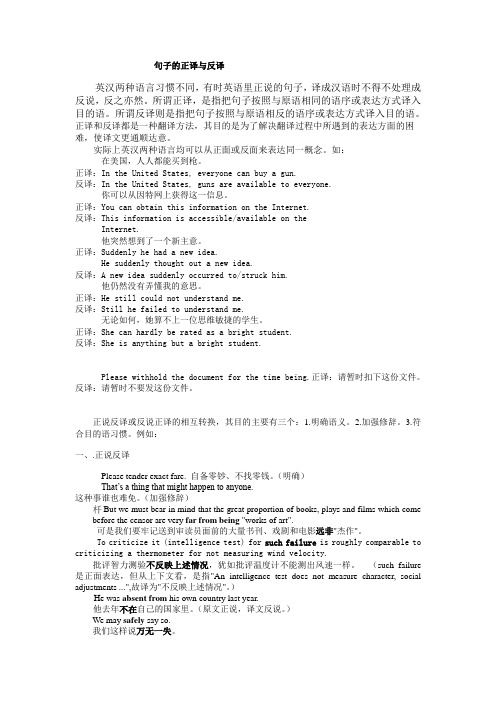
句子的正译与反译英汉两种语言习惯不同,有时英语里正说的句子,译成汉语时不得不处理成反说,反之亦然。
所谓正译,是指把句子按照与原语相同的语序或表达方式译入目的语。
所谓反译则是指把句子按照与原语相反的语序或表达方式译入目的语。
正译和反译都是一种翻译方法,其目的是为了解决翻译过程中所遇到的表达方面的困难,使译文更通顺达意。
实际上英汉两种语言均可以从正面或反面来表达同一概念。
如:在美国,人人都能买到枪。
正译:In the United States, everyone can buy a gun.反译:In the United States, guns are available to everyone.你可以从因特网上获得这一信息。
正译:You can obtain this information on the Internet.反译:This information is accessible/available on theInternet.他突然想到了一个新主意。
正译:Suddenly he had a new idea.He suddenly thought out a new idea.反译:A new idea suddenly occurred to/struck him.他仍然没有弄懂我的意思。
正译:He still could not understand me.反译:Still he failed to understand me.无论如何,她算不上一位思维敏捷的学生。
正译:She can hardly be rated as a bright student.反译:She is anything but a bright student.Please withhold the document for the time being.正译:请暂时扣下这份文件。
反译:请暂时不要发这份文件。
正说反译
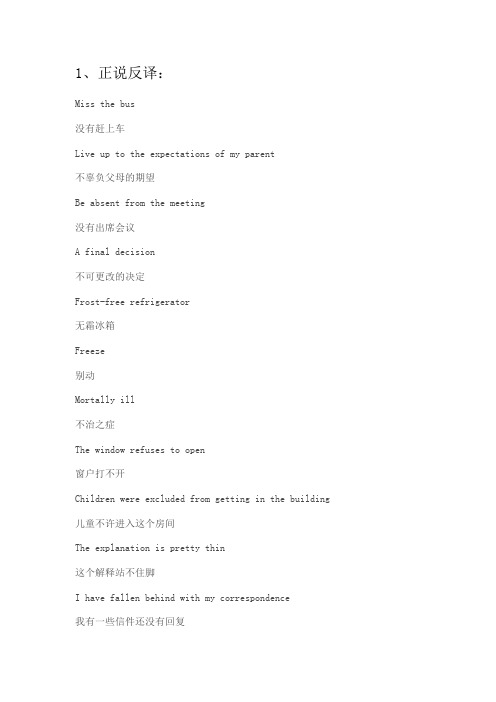
1、正说反译:Miss the bus没有赶上车Live up to the expectations of my parent不辜负父母的期望Be absent from the meeting没有出席会议A final decision不可更改的决定Frost-free refrigerator无霜冰箱Freeze别动Mortally ill不治之症The window refuses to open窗户打不开Children were excluded from getting in the building 儿童不许进入这个房间The explanation is pretty thin这个解释站不住脚I have fallen behind with my correspondence我有一些信件还没有回复Fully clothes, he fell across his bunk and was instantly sleep 衣服也不脱,他往床上横着一倒,不一会儿就睡着了Don’t lose time in posting this letter不要忘了寄这封信No deposit will be refunded unless ticket produced凭票退押金例1:原文:她忍住了没有笑出声。
译文:She refrained from laughing.例2:原文:花园根本无人整理。
译文:The garden was in a state of total neglect.例3:原文:我不能忍受你的脾气。
译文:Your temper is more than I can bear.例4:原文:他宁死不屈。
译文:He would die before yielding.例5:原文:生活远非净是乐事。
译文:Life is far from being a bed of roses.例6:原文:风景美得无以言表。
句子翻译(3)
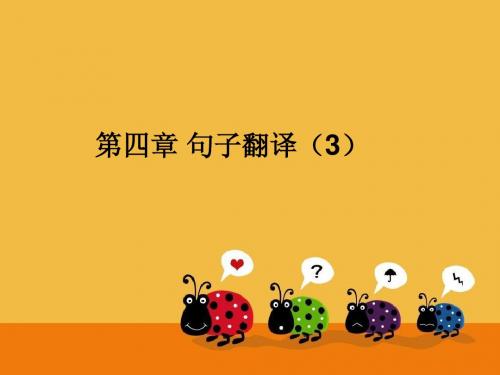
Exercises: 1) The world today is far from peaceful. 今天的世界还很不安宁。 2) The evidence is conclusive, excluding all possibilities of doubt. 证据确凿,毋庸置疑。 3) Mr. White has refrained from making any official comment on the coup in that country. 怀特先生并没有对该国的政变发表正式评论。 4) That served to strengthen instead of weaken our determination. 那件事没有削弱我们的决心,反倒增强了我们的决 心。
(5) can/could not + 比较级 1) I couldn’t feel better. 我觉得身体好极了。 2) I couldn’t agree with you more. 我太赞成你的看法了。
(6)其他 1) If that isn’t what I want! 我想要的就是这个呀! 2) He can’t see you quickly enough. 他很想尽快和你见面。
4) The pollution problem should be solved in good time. 污染问题应及时加以解决。 5) We were very much impressed by what she had said. 我们为她的言语深深打动。
(2) 译成汉语主动句 1) 保存原文主语 • This project should be finished as soon as possible. 这项工程应该尽早完成。 • This must be made clear to everybody. 这一点必须向大家讲明白。
30个句子翻译
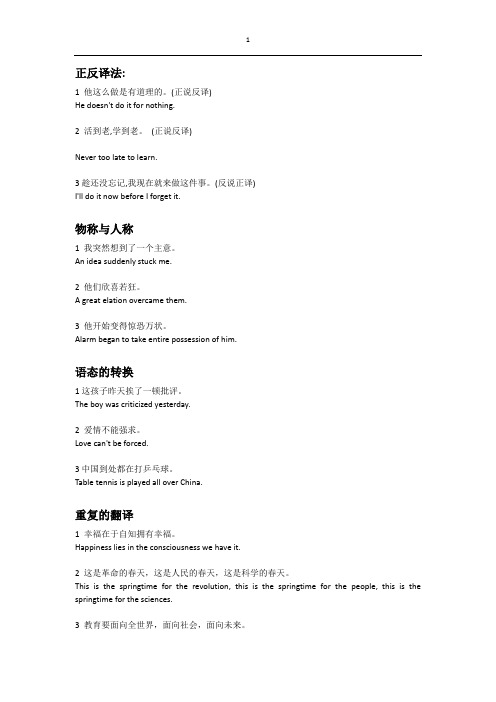
正反译法:1 他这么做是有道理的。
(正说反译)He doesn't do it for nothing.2 活到老,学到老。
(正说反译)Never too late to learn.3趁还没忘记,我现在就来做这件事。
(反说正译)I'll do it now before I forget it.物称与人称1 我突然想到了一个主意。
An idea suddenly stuck me.2 他们欣喜若狂。
A great elation overcame them.3 他开始变得惊恐万状。
Alarm began to take entire possession of him.语态的转换1这孩子昨天挨了一顿批评。
The boy was criticized yesterday.2 爱情不能强求。
Love can't be forced.3中国到处都在打乒乓球。
Table tennis is played all over China.重复的翻译1 幸福在于自知拥有幸福。
Happiness lies in the consciousness we have it.2 这是革命的春天,这是人民的春天,这是科学的春天。
This is the springtime for the revolution, this is the springtime for the people, this is the springtime for the sciences.3 教育要面向全世界,面向社会,面向未来。
Education must be geared to the needs of the world, the society and the future.外位语翻译1 从各个方面考虑,我们认为这是个好的计划。
All things considered, it is a good plan.2你的朋友们会说什么呢?Your friend, what will they say?3那只猫吃了那只老鼠,连皮带骨都吃了。
正说反译,反说正译法例子
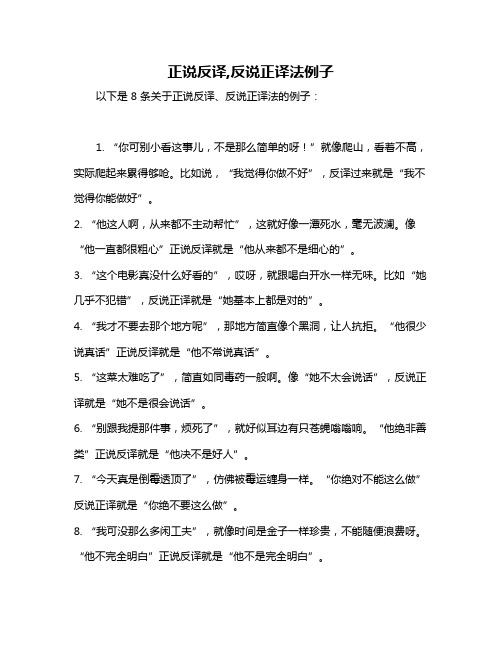
正说反译,反说正译法例子
以下是 8 条关于正说反译、反说正译法的例子:
1. “你可别小看这事儿,不是那么简单的呀!”就像爬山,看着不高,实际爬起来累得够呛。
比如说,“我觉得你做不好”,反译过来就是“我不觉得你能做好”。
2. “他这人啊,从来都不主动帮忙”,这就好像一潭死水,毫无波澜。
像“他一直都很粗心”正说反译就是“他从来都不是细心的”。
3. “这个电影真没什么好看的”,哎呀,就跟喝白开水一样无味。
比如“她几乎不犯错”,反说正译就是“她基本上都是对的”。
4. “我才不要去那个地方呢”,那地方简直像个黑洞,让人抗拒。
“他很少说真话”正说反译就是“他不常说真话”。
5. “这菜太难吃了”,简直如同毒药一般啊。
像“她不太会说话”,反说正译就是“她不是很会说话”。
6. “别跟我提那件事,烦死了”,就好似耳边有只苍蝇嗡嗡响。
“他绝非善类”正说反译就是“他决不是好人”。
7. “今天真是倒霉透顶了”,仿佛被霉运缠身一样。
“你绝对不能这么做”反说正译就是“你绝不要这么做”。
8. “我可没那么多闲工夫”,就像时间是金子一样珍贵,不能随便浪费呀。
“他不完全明白”正说反译就是“他不是完全明白”。
我觉得这种翻译方法很有趣,能让我们更灵活地理解和运用语言,有时候能更加准确地表达出我们的意思呢!。
正说反译、反说正译法

• 老师发现有些学生不在。
精品..
正说反译法(形容词)
• She said angrily,the men are all bad! • 她愤愤地说,男人都不是好东西! • You are a bad boy! • 你是个不听话的孩子! • The company’s failure was due to bad
• He is above meanness and deceit. • 他不至于做卑鄙和欺骗人的事情。
• Her behaviour was above suspicion. • 她的品行不容怀疑、
精品..
正说反译法(虚词)
• Few of my friends speak French. • 我的朋友中几乎没有人说法语。 • This was the last place the colonialists
• The revolutionaries were beaten,refused anything to read,kept for a time in semidarkness as well as in chains.
• 那些革命者当时受到拷打,不准阅读任何书刊..
• The window refuses to open. • 窗户打不开。
trying to avoid you ? • 你知道她为什么总是不想见到你吗? • He tried to avoid answering my
questions. • 他试图避而不答我的问题。
精品..
正说反译法(形容词)
• There are two aspects to everything,to say there is only one is to be aware of one aspect and to be ignorant of the other.
正反、反正译法

(二)英译汉反说正译法:英语从反面表达, 汉语从正面表达
反正译是用变换语气的方法把原文的否定式译成 汉语的肯定式。翻译时运用这一方法可使译文自然 流畅。 英语中含有否定词语的结构和双重否定的结构常有 这种方法来解释。英语中表达否定意思的词或词组 指带有de-, dis-, im-, in-, un-, less-等词缀的词和 no, not, not…until, no less than, no more than, Nothing than, nothing but, cannot…too 等表示 否定的词或词组。
赶快把这封信寄出去。
She is no less diligent than her sister. 她和她姐姐一样用功。 Such things couldn’t long escape notice. 这类事情迟早会被人发觉的。 We did not notice this matter until yesterday. 直到昨天我们才注意到这件事。 We can not be too careful in doing experiments. 我们做实验越仔细越好。
(一)英译汉正说反译法:英语从正面表达, 汉语从反面表达
正反译是用变换语气的方法把原文的肯定式译成 汉语的否定式。翻译时运用这一方法可使译文合乎 汉语规范,更恰当地表达原文的意思。
例如, correct 可译成“没有毛病”,wonder可译成 “不知道”,exactly可译成“一点不错”,anythi but可译成“一点也不”等等。
Never too old to learn. 活到老,学到老。 I couldn’t agree more about it. 我对此非常赞同。 His story was nothing but lies. 他的那番话纯粹是谎言。 Our advice was not lost on him. 我们的劝告对他起了作用。 There is no rule but exceptions. 凡规则总有例外。 Don’t lose time in posting this letter.
与翻译有关的那些--反译法

The window refuses to open. 窗户打不开。
正说反译法(动词)
She was refused admittance by them. 他们不许她进去。 Permission to enter was denied. 不准入内。 I was denied the chance of going to university. 我没有得到上大学的机会。
Her abstraction was not because of the tea party. • 她那心不在焉的神情,并不是因为茶话会。
His hesitation led to his failure. • 他不果断/犹豫不决导致了他的失败。
正说反译法(虚词:介词)
To do this is beyond my ability. 干这事我力不胜任。 It was beyond his power to do so. 他无权这样做。
正说反译法(虚词:连词)
The soldiers would fight to death before they surrender. 战士们宁可战斗到死,而决不投降。
I will not go unless I hear from him. 如果他不通知我,我就不去。
正说反译法(虚词:连词)
What you’ve said is above me. 你所说的我不懂。
正说反译法(虚词:介词)
It seems against nature. 这似乎不符合自然规律。
He is above meanness and deceit. 他不至于做卑鄙和欺骗人的事情。
汉译英的几种翻译技巧
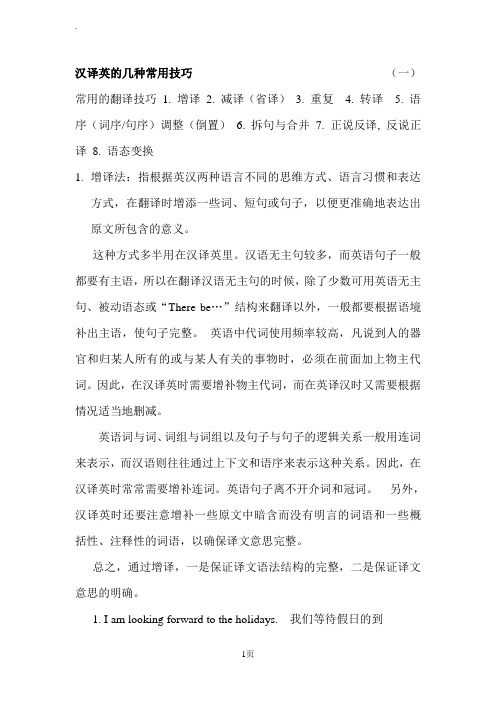
汉译英的几种常用技巧(一)常用的翻译技巧1. 增译2. 减译(省译)3. 重复 4. 转译 5. 语序(词序/句序)调整(倒置) 6. 拆句与合并7. 正说反译, 反说正译8. 语态变换1.增译法:指根据英汉两种语言不同的思维方式、语言习惯和表达方式,在翻译时增添一些词、短句或句子,以便更准确地表达出原文所包含的意义。
这种方式多半用在汉译英里。
汉语无主句较多,而英语句子一般都要有主语,所以在翻译汉语无主句的时候,除了少数可用英语无主句、被动语态或“There be…”结构来翻译以外,一般都要根据语境补出主语,使句子完整。
英语中代词使用频率较高,凡说到人的器官和归某人所有的或与某人有关的事物时,必须在前面加上物主代词。
因此,在汉译英时需要增补物主代词,而在英译汉时又需要根据情况适当地删减。
英语词与词、词组与词组以及句子与句子的逻辑关系一般用连词来表示,而汉语则往往通过上下文和语序来表示这种关系。
因此,在汉译英时常常需要增补连词。
英语句子离不开介词和冠词。
另外,汉译英时还要注意增补一些原文中暗含而没有明言的词语和一些概括性、注释性的词语,以确保译文意思完整。
总之,通过增译,一是保证译文语法结构的完整,二是保证译文意思的明确。
1. I am looking forward to the holidays. 我们等待假日的到2.Much of our morality is customary. 我们大部分的道德观念都有习惯性。
3.Reading makes a full man; conference a ready man; and writing an exact man.读书使人充实,讨论使人机智,笔记使人精确。
4.Histories make men wise; poets witty; the mathematics subtle; natural philosophy deep; moral grave; logic and rhetoric able to contend. 读史使人明智,读诗使人灵秀,数学使人周密,科学使人深刻,伦理使人庄重,逻辑修辞之学使人善辩。
反说正译英语例子
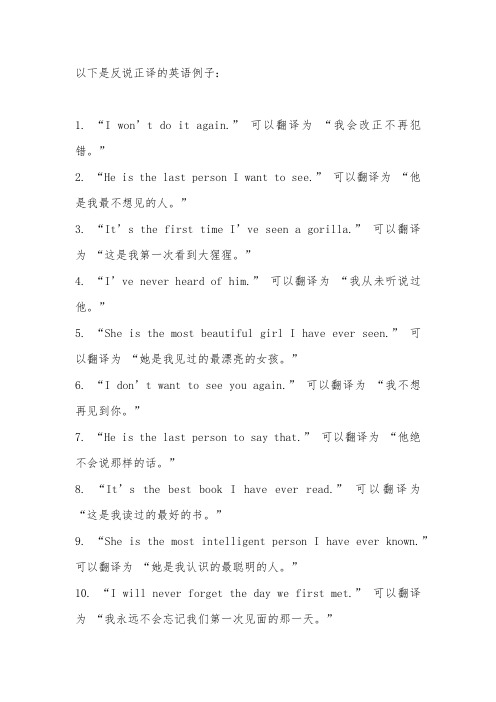
以下是反说正译的英语例子:
1. “I won’t do it again.” 可以翻译为“我会改正不再犯错。
”
2. “He is the last person I want to see.” 可以翻译为“他
是我最不想见的人。
”
3. “It’s the first time I’ve seen a gorilla.” 可以翻译
为“这是我第一次看到大猩猩。
”
4. “I’ve never heard of him.” 可以翻译为“我从未听说过他。
”
5. “She is the most beautiful girl I have ever seen.” 可
以翻译为“她是我见过的最漂亮的女孩。
”
6. “I don’t want to see you again.” 可以翻译为“我不想
再见到你。
”
7. “He is the last person to say that.” 可以翻译为“他绝
不会说那样的话。
”
8. “It’s the best book I have ever read.” 可以翻译为“这是我读过的最好的书。
”
9. “She is the most intelligent person I have ever known.” 可以翻译为“她是我认识的最聪明的人。
”
10. “I will never forget the day we first met.” 可以翻译
为“我永远不会忘记我们第一次见面的那一天。
”
希望以上内容对您有所帮助。
英语翻译正说反译反说正译
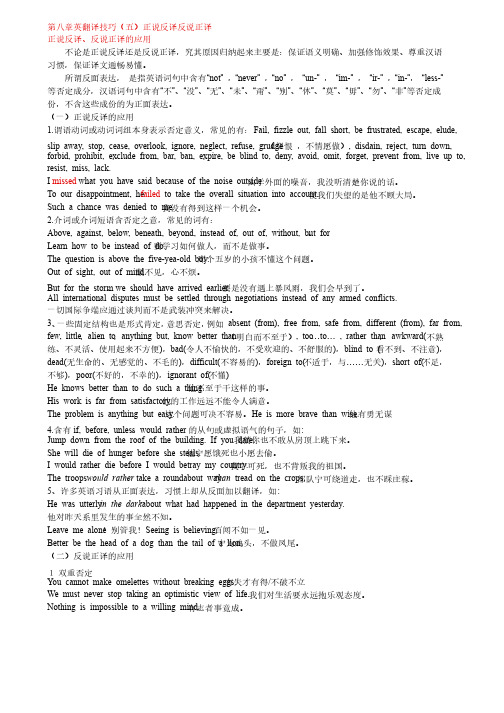
第八章英翻译技巧(五)正说反译反说正译正说反译、反说正译的应用不论是正说反译还是反说正译,究其原因归纳起来主要是:保证语义明确、加强修饰效果、尊重汉语习惯,保证译文通畅易懂。
所谓反面表达,是指英语词句中含有“not”,“never”,“no”,“un-”,“im-”,“ir-”,“in-”,“less-”等否定成分,汉语词句中含有“不”、“没”、“无”、“未”、“甭”、“别”、“休”、“莫”、“毋”、“勿”、“非”等否定成份,不含这些成份的为正面表达。
(一)正说反译的应用1.谓语动词或动词词组本身表示否定意义,常见的有:Fail, fizzle out, fall short, be frustrated, escape, elude, slip away, stop, cease, overlook, ignore, neglect, refuse, grudge(怨恨,不情愿做), disdain, reject, turn down, forbid, prohibit, exclude from, bar, ban, expire, be blind to, deny, avoid, omit, forget, prevent from, live up to, resist, miss, lack. I missed what you have said because of the noise outside.由于外面的噪音,我没听清楚你说的话。
To our disappointment, he failed to take the overall situation into account. 使我们失望的是他不顾大局。
Such a chance was denied to me.我没有得到这样一个机会。
2.介词或介词短语含否定之意,常见的词有:Above, against, below, beneath, beyond, instead of, out of, without, but for。
英汉翻译(8)正反译法

• Affirmative-negative transformation of connectives • 1) It is before ten yet. • 还不到十点钟。 • 2) Don't come in unless I call you. • 要是我不来叫你,你别来。 • 3) He took two steps and heard, rather than saw, a strange whirring sound coming toward him. • 他走了两步就听见,而不是看见,一个奇怪的呼 啸声冲他而来。 • 4) You cannot succeed unless you work hard. • 你不努力是不会成功的。
• 按照专家们的说法,不用说打仗,就连出海也是 不容许的。
• 4) He tried to catch one of the rafts with a boat hook but missed. • 他努力想用船钩钩住一只竹筏,可是没钩着。 • 5) Your legs are young enough to hold you. • 你的腿还没老得走不动呢。 • 6) These are days when nerves are worn thin. • 这些日子教人吃不消。 • 7) "You'll go in and say good-bye to Miss Pinkerton, Becky!" • "I suppose I must," said Miss Sharp calmly, and much to the wonder of Miss Jemima;... • “贝吉,你要进去跟娉克敦小姐道声别。” • “我想这是免不了的。”夏普小姐不动声色地说,而吉米 小姐直觉诧异。
考研英语翻译技巧
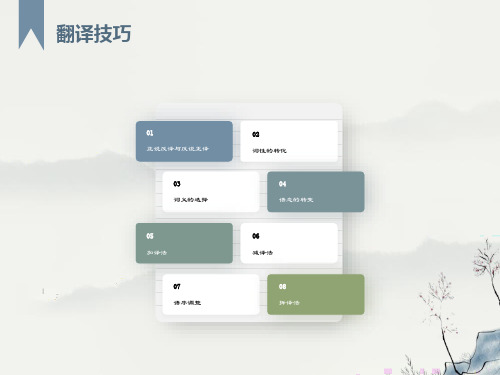
02
词性的转化
03
词义的选择
06
减译法
07
语序调整
翻译技巧
正说反译与反说正译
Vanity is a constant; people will only start shopping more sustainably when they can’t afford not to. 虚荣心不会变,人只有负担不起的时候才会在购物的时候考虑可持续性。 Solving the problems of places like Ferguson is less about passing more anti-discrimination laws than about rekindling economic growth and spreading the proceeds. 要解决像弗格森市这种地方的问题,方法不在于通过更多反歧视法案,而在于重新振兴经济增长并让更多的人享受到收益。 This top-down conception of the fashion business couldn’t be more out of date or at odds with the feverish world described in Overdressed, Elizabeth Cline’s three-year indictment of “fast fashion”. 这种时装业自上而下的概念太过时了,与伊丽莎白·克莱恩在《过度着装》一书中所描绘的狂热世界不相一致,该书是她历时三年对“快时尚”的控诉。
然而解决美国种族问题取决于更有活力的经济和具体的政策与治安管理细节,这一事实本身就是一种进步。
拆译法 (一般涉及从句)
有些人不了解必须通过动物试验才能研究出这些疗法以及新的疗法和疫苗,对这些人来说,动物试验往好里说是浪费,往坏里说是残忍。
正说反说
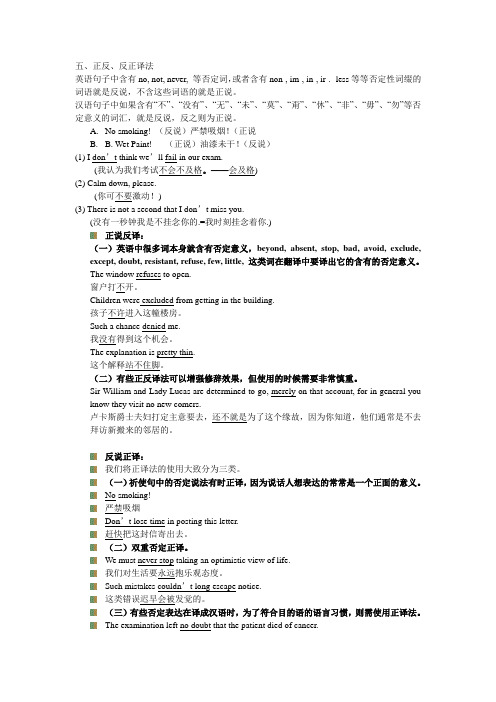
五、正反、反正译法英语句子中含有no, not, never, 等否定词,或者含有non-, im-, in-, ir-. -less等等否定性词缀的词语就是反说,不含这些词语的就是正说。
汉语句子中如果含有“不”、“没有”、“无”、“未”、“莫”、“甭”、“休”、“非”、“毋”、“勿”等否定意义的词汇,就是反说,反之则为正说。
A.No smoking! (反说)严禁吸烟!(正说B. B. Wet Paint! (正说)油漆未干!(反说)(1) I don’t think we’ll fail in our exam.(我认为我们考试不会不及格。
——会及格)(2) Calm down, please.(你可不要激动!)(3) There is not a second that I don’t miss you.(没有一秒钟我是不挂念你的.=我时刻挂念着你.)正说反译:(一)英语中很多词本身就含有否定意义,beyond, absent, stop, bad, avoid, exclude, except, doubt, resistant, refuse, few, little, 这类词在翻译中要译出它的含有的否定意义。
The window refuses to open.窗户打不开。
Children were excluded from getting in the building.孩子不许进入这幢楼房。
Such a chance denied me.我没有得到这个机会。
The explanation is pretty thin.这个解释站不住脚。
(二)有些正反译法可以增强修辞效果,但使用的时候需要非常慎重。
Sir William and Lady Lucas are determined to go, merely on that account, for in general you know they visit no new comers.卢卡斯爵士夫妇打定主意要去,还不就是为了这个缘故,因为你知道,他们通常是不去拜访新搬来的邻居的。
正说反译与反说正译
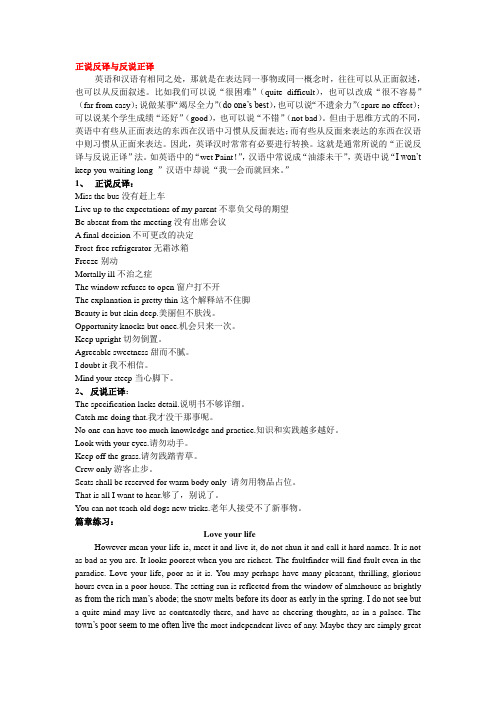
正说反译与反说正译英语和汉语有相同之处,那就是在表达同一事物或同一概念时,往往可以从正面叙述,也可以从反面叙述。
比如我们可以说“很困难”(quite difficult),也可以改成“很不容易”(far from easy);说做某事“竭尽全力”(do one’s best),也可以说“不遗余力”(spare no effect);可以说某个学生成绩“还好”(good),也可以说“不错”(not bad)。
但由于思维方式的不同,英语中有些从正面表达的东西在汉语中习惯从反面表达;而有些从反面来表达的东西在汉语中则习惯从正面来表达。
因此,英译汉时常常有必要进行转换。
这就是通常所说的“正说反译与反说正译”法。
如英语中的“wet Paint!”,汉语中常说成“油漆未干”,英语中说“I won’t keep you waiting long ”汉语中却说“我一会而就回来。
”1、正说反译:Miss the bus没有赶上车Live up to the expectations of my parent不辜负父母的期望Be absent from the meeting没有出席会议A final decision不可更改的决定Frost-free refrigerator无霜冰箱Freeze别动Mortally ill不治之症The window refuses to open窗户打不开The explanation is pretty thin这个解释站不住脚Beauty is but skin deep.美丽但不肤浅。
Opportunity knocks but once.机会只来一次。
Keep upright切勿倒置。
Agreeable sweetness甜而不腻。
I doubt it我不相信。
Mind your steep当心脚下。
2、反说正译:The specification lacks detail.说明书不够详细。
英译汉Translation2
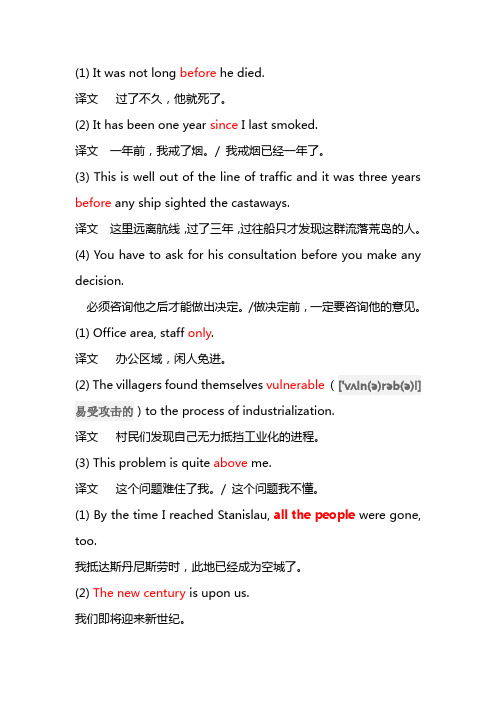
(1) It was not long before he died.译文过了不久,他就死了。
(2) It has been one year since I last smoked.译文一年前,我戒了烟。
/ 我戒烟已经一年了。
(3) This is well out of the line of traffic and it was three years before any ship sighted the castaways.译文这里远离航线,过了三年,过往船只才发现这群流落荒岛的人。
(4) You have to ask for his consultation before you make any decision.必须咨询他之后才能做出决定。
/做决定前,一定要咨询他的意见。
(1) Office area, staff only.译文办公区域,闲人免进。
(2) The villagers found themselves vulnerable(['vʌln(ə)rəb(ə)l]易受攻击的)to the process of industrialization.译文村民们发现自己无力抵挡工业化的进程。
(3) This problem is quite above me.译文这个问题难住了我。
/ 这个问题我不懂。
(1) By the time I reached Stanislau, all the people were gone, too.我抵达斯丹尼斯劳时,此地已经成为空城了。
(2) The new century is upon us.我们即将迎来新世纪。
(3)After three sips it was gone, but I could still feel its warmth and energy. 我啜吸三口就喝光了,不过咖啡的香浓温暖我却至今难忘。
(4)Being a writer had been far from my expectations; being a best-selling author was almost unfathomable(深不可测的;无底的;莫测高深的).我根本没有料到过自己能成为一名作家,更不敢想象自己能成为一位畅销书作者。
句子翻译正说反译反说正译
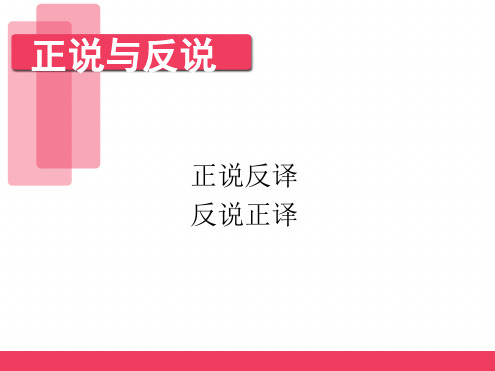
? He went to the station to meet his friend, but he missed him in the crowd.
反说正译
? ?
? ?
? ?
? ?
3.形容词和形容词短语:
free from, far from, safe from, few, little, short
反说正译
第一,汉语的否定词在句中无否 定意义。 ? 这块地里的麦子长得不大离儿。 ? The wheat on this field is pretty good. ? 第二,使语气委而含蓄。 ? 谁没有个三灾六难的。 ? There is a crook in the lot of every one.
coming on. ? 他不自然地咳了起来。 ? He coughed with embarrassment .
反说正译
? 在汉译英中,反说正译的情况非常普遍,这是由于英语中 有大量表达否定意义的词汇可以替代汉语的否定表达。
? 1. 名词: ? absence, failure, refusal, ignorance, neglect,
everyone of us.
反说正译
? 2.动词:
? fail, miss, lack, ignore, refuse, neglect, deny, overlook, exclude 等等。
? 使我们失望的是他 不顾大局。
? To our disappointment, he failed to take the overall situation into account.
exclusion 等等。 ? 他开车时心不在焉,几乎闯祸。 ? His absence of mind during the driving nearly caused
句子翻译参考

句子的翻译增译法1、增加动词1) Reading makes a full man; conference a ready man; and writing an exact man.√读书使人充实,讨论使人机智,笔记(写作)使人准确。
2) We don’t regret, we never have and never will.我们不会后悔,我们从来没有后悔过,我们将来也不会后悔。
3) After the basketball, he still has an important conference.看完篮球比赛之后,他还有一个重要会议要参加。
2. 增加形容词或副词1) With what enthusiasm the Chinese people are building socialism!中国人民正以多么高的热情建设社会主义啊!2) The crowds melted away.人群渐渐散开了。
3) As he sat down and began talking, words poured out.他一坐下来就讲开了,滔滔不绝地讲个没完。
4) She lingered long over his letter.她反反复复地回味着他的来信。
5) In the films of those days, all too often it was the same one: boy tractor driver meets girl tractor driver; they fall in love and drive tractor together.在那时候的电影里,总是老一套:男拖拉机手和女拖拉机手始而相遇,继而相爱,终而并肩开拖拉机了。
3. 增加名词1) First you borrow, then you beg.头一遭借钱,下一遭就讨饭。
2) Mary washed for a living after her husband died of cancer.玛丽的丈夫癌症去世后,就靠洗衣服维持生活。
- 1、下载文档前请自行甄别文档内容的完整性,平台不提供额外的编辑、内容补充、找答案等附加服务。
- 2、"仅部分预览"的文档,不可在线预览部分如存在完整性等问题,可反馈申请退款(可完整预览的文档不适用该条件!)。
- 3、如文档侵犯您的权益,请联系客服反馈,我们会尽快为您处理(人工客服工作时间:9:00-18:30)。
proposal with dignity.
正说反译
(一)汉、英两种语言的表达习惯不 同。
• 我很快就可以回老家了。
• It will not be long before I go back to my hometown.
(二)语气的需要。 • 有失才有得。
• You can’t make an omelet without breaking eggs.
正说与反说
• 但是由于汉英两种语言表达习惯 不同,在很多情况下会出现正说 反译,反说正译的情况。
• 我完全同意。 • I can't agree with you more. • 你们大错特错了。 • You couldn't be more mistaken.
正说与反说
• 油漆未干! • Wet paint! • 不好意思! • I‘m sorry. • 外表往往是靠不住的。 • Appearances are often deceptive. • 美国不失体面地接受了这项和平方案。 • The U.S.A accepted the peace
他上火车站去接他的朋友,可是未 能在人群中见到他。
He went to the station to meet his friend, but he missed him in the crowd.
反说正译
• •
• •
• •
• •
ห้องสมุดไป่ตู้
3.形容词和形容词短语:
free from, far from, safe from, few, little, short 这次演出根本没有失败,而是十分成功。
bloom。 • 黄鼠狼给鸡拜年,不怀好心。 • The weasel goes to pay respects to the
hen without the best of intentions.
• The weasel pays a courtesy visit to the hen with evil intent.
正说反译
(三)为了使原来隐含意义更加明确, 更便于直接理解。
• 在困难面前,他总是勇往直前。 • He never flinched from any
difficulties. (四)充分利用英语某些词语的特点,
使译文更精当。 • 在白天看来,它们就平凡得很。 • By daylight,they were nothing
everyone of us.
反说正译
• •
• •
• •
2.动词:
fail, miss, lack, ignore, refuse, neglect, deny, overlook, exclude 等等。
使我们失望的是他不顾大局。
To our disappointment, he failed to take the overall situation into account.
反说正译
第三,英语有更简练而恰当的表达 法。
• 人不可貌相。 Beauty is but skin deep.
第四,把原文隐含的意思明了化。 • 我觉得这么做后果不妙。
I think the worst of the problem is behind us.
反说正译
• 日子很快过去了,她做工却丝毫没有松懈。 • The days passed quickly, but she worked as
正说与反说
正说反译 反说正译
正说与反说
• 人们在叙述同一事物或表达同一 思想时,可以正说,也可以反说, 汉语如此,英语也如此。
• 例如: • 他是外乡人。 • 他不是本地人。
正说与反说
• 通常情况下,汉译英采用对应译法,即正说 正译,反说反译。
• 例如: • 花在许多人家里开放着。 • In many little gardens flowers were in
反说正译
第一,汉语的否定词在句中无否 定意义。 • 这块地里的麦子长得不大离儿。 • The wheat on this field is pretty good. • 第二,使语气委婉而含蓄。 • 谁没有个三灾六难的。 • There is a crook in the lot of every one.
exclusion 等等。 • 他开车时心不在焉,几乎闯祸。 • His absence of mind during the driving nearly caused
an accident. • 我们完全不知道他的计划。 • We are in complete ignorance of his plan. • 他未能履行诺言,我们大家都很失望。 • His failure to carry out his promise has disappointed
out of the common.
正说反译练习
• Exercises • 他为这件事竭尽全力。
He spared no pains/efforts in doing this. • 她对他百依百顺。 • She never denied him anything. • 返回祖国的念头始终萦绕在他们心中。 • The thought of returning to his motherland never deserted him.
coming on. • 他不自然地咳了起来。 • He coughed with embarrassment.
反说正译
• 在汉译英中,反说正译的情况非常普遍,这是由于英语中 有大量表达否定意义的词汇可以替代汉语的否定表达。
• 1. 名词: • absence, failure, refusal, ignorance, neglect,
